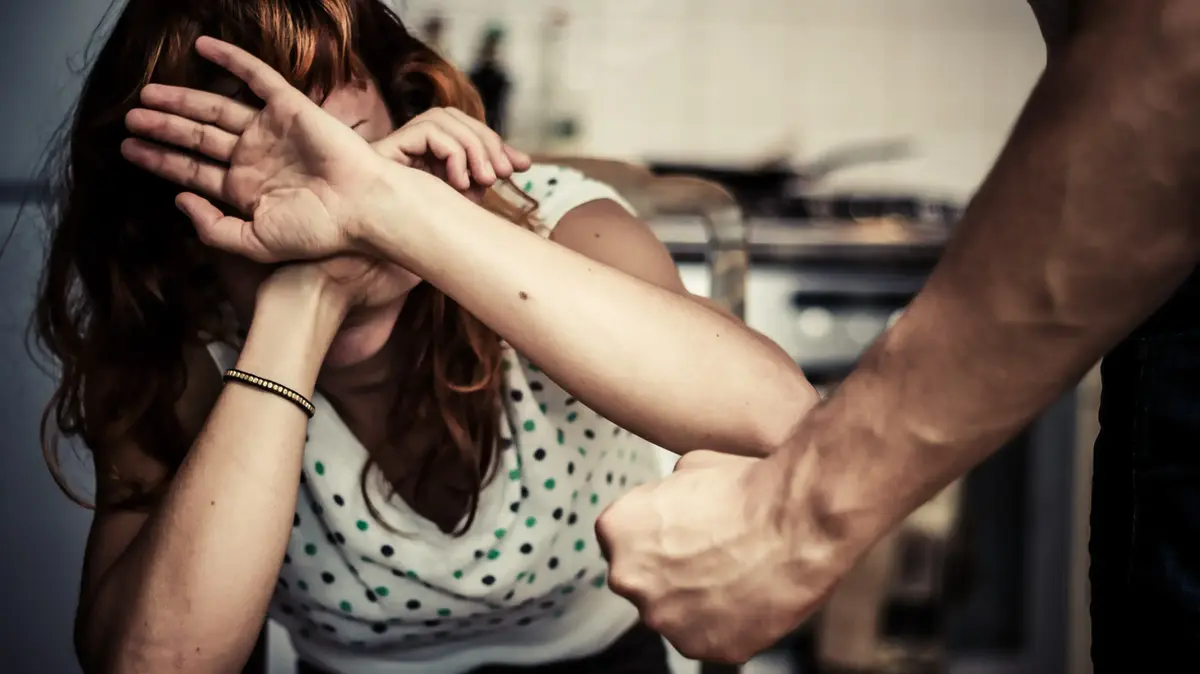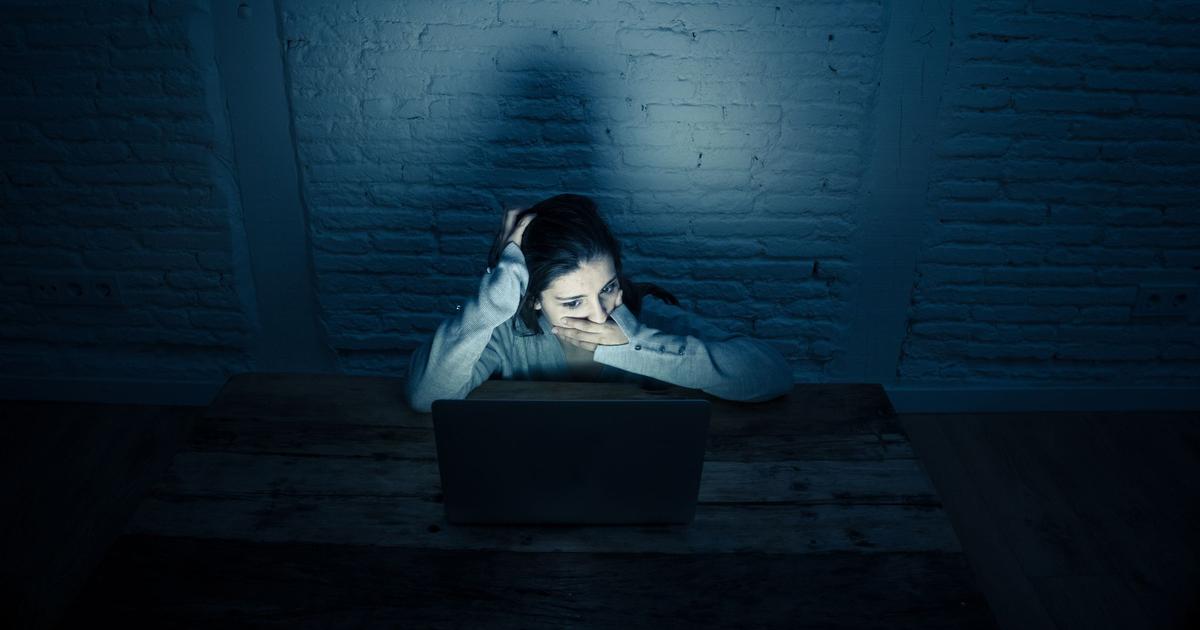Icon: enlarge
In a VR experience from the Spanish start-up "Virtual Bodywork", users take on the woman's perspective
Photo: Virtual Bodyworks
The man looks threatening and scolds: "You look like shit," he says.
"Look at you, fat cow." He's getting closer and closer - it looks like he's about to strike.
With virtual reality glasses on their heads, violent criminals feel what it feels like to be a victim.
The "Oculus Quest" broadcasts
The user moves into the virtual living room in which the scene is set.
The Spanish prison psychologist Nicolás Barnes once observed an inmate quickly tearing the VR headset off his head - because the experience was so upsetting to him.
"I was embarrassed and angry," said another inmate of the experience.
"I asked myself: 'Fuck, am I really acting like that?'"
Barnes works in the Mas d'Enric prison in Tarragona in northeastern Spain with perpetrators who are incarcerated for beating or strangling their partners.
Icon: enlarge
Working with perpetrators can prevent violence
Photo: Kamil Zihnioglu / AP
The virtual reality training is one of the few initiatives worldwide that starts with the perpetrators in order to combat domestic violence.
Most programs focus on the victims - although perpetrator projects are an important element in breaking the cycle of violence.
While many more traditional approaches aim to get women out of violent relationships, the reality is often different: Many only separate from their partners after years, and even criminals often return to their families after a prison term.
Women can therefore also benefit from projects in which men learn to deal with aggression.
Such approaches are particularly important at the moment, as the cases of domestic violence have increased in the corona crisis.
Aid agencies in many countries report an increase in emergency calls and incidents.
Living together in a confined space and financial bottlenecks exacerbate existing conflicts, while at the same time those affected can hardly evade brutal partners in lockdown.
Virtual Reality as an empathy machine
Initiatives from Spain, the USA and South Africa show how different methods can help perpetrators to change their behavior - including training with virtual reality (VR), but also group therapy or digital campaigns.
Six Catalan prisons are currently using the VR offer of the Spanish start-up "Virtual Bodyworks" from Barcelona: It complements rehabilitation, criminals have to deal with their behavior and aspects such as macho behavior, impulsiveness and empathy before they are released.
Icon: enlarge
With virtual reality, perpetrators learn to empathize with other people
Photo: Virtual Bodyworks
Empathy is a key factor when working with perpetrators: Many people lack the willingness and ability to empathize with other people, and they often misinterpret fearful facial expressions of women as positive.
Prison psychologist Barnes is convinced that virtual reality can accelerate the learning process: "It's completely different from discussing violence in theory," says the 46-year-old.
The start-up "Virtual Bodyworks" is also researching scientifically how virtual reality can be used for prevention: According to a study, changing perspectives helps users to better recognize fear in female faces.
Therapy by zoom
Many states in the USA also lack adequate programs for violent men; in the progressive state of Vermont, therapist Bill Pelz-Walsh and Professor of Peace and Conflict Studies John Ungerleider have been working with violent criminals for more than 25 years.
They have currently switched their anti-aggression training to Zoom.
Participation in the state-certified, 30-week program “Taking Responsibility” is voluntary; the men must transfer 30 dollars per session.
Many of the participants are college-educated workers between the ages of 20 and 30 who are serving suspended sentences and hoping for a better evaluation in court.
During the sessions, the group of ten watches instructional videos: One scene shows a man getting angry because his girlfriend wants to learn more.
Then the participants should empathize with the woman, discuss their own experiences and develop alternative options for action.
"I'm not a high-tech guy and first had to figure out how to show videos using Zoom instead of sticking them into the DVD player," admits therapist Pelz-Walsh.
He finds that digitally it is more difficult to develop a relationship with the participants.
Friendships develop less often between men, too - many of them switch to their car or an adjoining room via smartphone, and not everyone can see each other on the mini screen at the same time.
Icon: enlarge
Protest against violence: In the first week of lockdown alone, more than 2,200 incidents of domestic violence were reported in South Africa
Photo: Marius Bosch / REUTERS
With the poor resolution, it is also not possible to tell whether someone is violating the alcohol and drug ban - probation officers have also reduced personal conversations during the pandemic, so that the men are more left to themselves.
But the biggest problem in rural Vermont is the internet: Sometimes the internet just breaks down.
Graduates of the course nevertheless report positive effects: "Taking a deep breath helped me avoid conflicts," said one man in the feedback conversation.
“I'm not that hothead anymore.” Another realized that he had emotionally abused his ex-wife thousands of times and wrote a letter of apology.
According to a study from Ohio, around half of the women interviewed by perpetrators stated that the intervention had worked.
Social media against violence and excessive alcohol
However, in the corona crisis, immediate immediate aid is also required to prevent violence.
In South Africa, for example, the social media platforms of the non-governmental organization “Sonke Gender Justice” are a first point of contact that is explicitly aimed at men.
The team usually organizes workshops in townships, since the lockdown in March 2020 it has been trying to reach people mainly through digital channels.
"Most men turn to us because they have the feeling that they are on the verge of collapse," says 28-year-old communications manager Given Sigauqwe from Johannesburg.
"They are afraid that they could become violent in the near future."
The Gender-Based Violence Command Center (GBVCC) of the South African government also offers advice on domestic violence by telephone, email, Skype or WhatsApp - but many men seem to feel that they are in better hands with "Sonke Gender Justice" than with a general one Hotline.
"Many are afraid that they will be convicted," said Sigauqwe.
If those affected need more in-depth psychosocial advice, the team will refer them to government agencies or other organizations.
Icon: enlarge
Before the crisis, "Sonke Gender Justice" teams were out and about in the townships - now they can be contacted via WhatsApp and Facebook
Photo: Per-Anders Pettersson
Sigauqwe has also developed social media campaigns to break taboos around domestic violence.
Under the hashtag #SpeakOut, South Africans are encouraged to talk about domestic violence and to report what is happening in their neighborhood - a kind of digital neighborhood watch.
Another campaign warns against excessive alcohol consumption as a driver of violence.
WhatsApp groups, but also Facebook, are the most important platforms for keeping in touch with township residents.
But the inequality in the country is reflected digitally: Not every poor citizen has an internet-enabled cell phone or an internet flat rate.
So that they don't lose touch, the organization provides some with credit for mobile Internet or Internet sticks for laptops.
Soon some workshops will take place on site again - at least in regions that are not corona hotspots.
Icon: The mirror
This contribution is part of the Global Society project
What is the Global Society project? Up arrow Down arrow
Under the title Global Society, reporters from
Asia, Africa, Latin America and Europe
report on injustices in a globalized world, socio-political challenges and sustainable development.
The reports, analyzes, photo series, videos and podcasts appear in the international section of SPIEGEL.
The project is long-term and will be supported by the Bill & Melinda Gates Foundation (BMGF) for three years.
A detailed FAQ with questions and answers about the project can be found here.
What does the funding look like in concrete terms? Up arrow Down arrow
The Bill & Melinda Gates Foundation (BMGF) is supporting the project for three years with a total of around 2.3 million euros.
Is the journalistic content independent of the foundation? Up arrow Down arrow
Yes.
The editorial content is created without any influence from the Gates Foundation.
Do other media have similar projects? Up arrow Down arrow
Yes.
Major European media outlets such as "The Guardian" and "El País" have set up similar sections on their news pages with "Global Development" and "Planeta Futuro" with the support of the Gates Foundation.
Have there already been similar projects at SPIEGEL? Up arrow Down arrow
In recent years, SPIEGEL has already implemented two projects with the European Journalism Center (EJC) and the support of the Bill & Melinda Gates Foundation: The "Expedition The Day After Tomorrow" on global sustainability goals and the journalistic refugee project "The New Arrivals", as part of this several award-winning multimedia reports on the topics of migration and flight have emerged.
Where can I find all publications on Global Society? Up arrow Down arrow
The pieces can be found at SPIEGEL on the topic Global Society.














